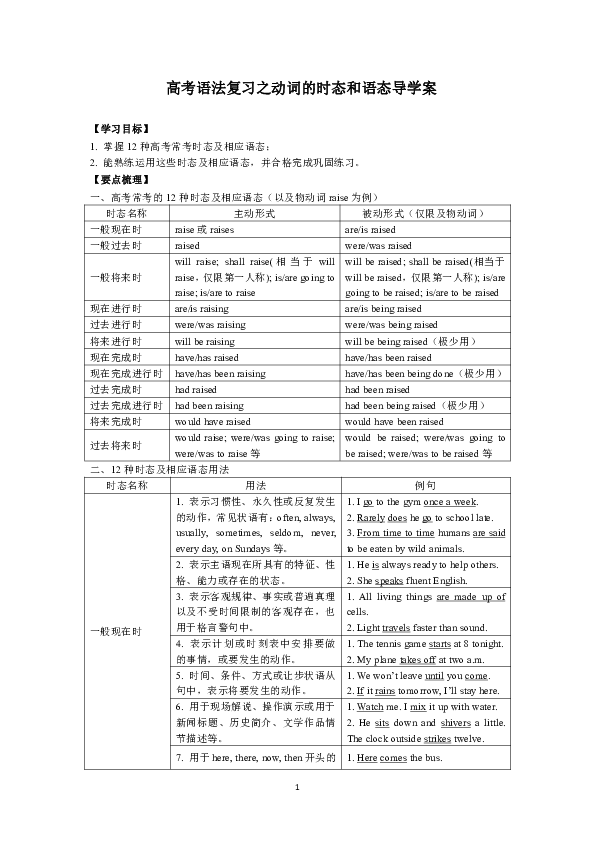
高考语法复习之动词的时态和语态导学案 【学习目标】 1. 掌握12种高考常考时态及相应语态; 2. 能熟练运用这些时态及相应语态,并合格完成巩固练习。 【要点梳理】 一、高考常考的12种时态及相应语态(以及物动词raise为例) 时态名称 主动形式 被动形式(仅限及物动词) 一般现在时 raise或raises are/is raised 一般过去时 raised were/was raised 一般将来时 will raise; shall raise(相当于will raise,仅限第一人称); is/are going to raise; is/are to raise will be raised; shall be raised(相当于will be raised,仅限第一人称); is/are going to be raised; is/are to be raised 现在进行时 are/is raising are/is being raised 过去进行时 were/was raising were/was being raised 将来进行时 will be raising will be being raised(极少用) 现在完成时 have/has raised have/has been raised 现在完成进行时 have/has been raising have/has been being done(极少用) 过去完成时 had raised had been raised 过去完成进行时 had been raising had been being raised(极少用) 将来完成时 would have raised would have been raised 过去将来时 would raise; were/was going to raise; were/was to raise等 would be raised; were/was going to be raised; were/was to be raised等 二、12种时态及相应语态用法 时态名称 用法 例句 一般现在时 1. 表示习惯性、永久性或反复发生的动作,常见状语有:often, always, usually, sometimes, seldom, never, every day, on Sundays等。 1. I go to the gym once a week. 2. Rarely does he go to school late. 3. From time to time humans are said to be eaten by wild animals. 2. 表示主语现在所具有的特征、性格、能力或存在的状态。 1. He is always ready to help others. 2. She speaks fluent English. 3. 表示客观规律、事实或普遍真理以及不受时间限制的客观存在,也用于格言警句中。 1. All living things are made up of cells. 2. Light travels faster than sound. 4. 表示计划或时刻表中安排要做的事情,或要发生的动作。 1. The tennis game starts at 8 tonight. 2. My plane takes off at two a.m. 5. 时间、条件、方式或让步状语从句中,表示将要发生的动作。 1. We won’t leave until you come. 2. If it rains tomorrow, I’ll stay here. 6. 用于现场解说、操作演示或用于新闻标题、历史简介、文学作品情节描述等。 1. Watch me. I mix it up with water. 2. He sits down and shivers a little. The clock outside strikes twelve. 7. 用于here, there, now, then开头的倒装句中。 1. Here comes the bus. 2. There she goes. 3. Now comes your turn. 一般过去时 1. 表示过去某一具体时间发生的动作或存在的状态,常与表示过去的时间状语连用。 1. I met an old friend the other day. 2. He got injured at work yesterday. 3. I saw her come back just now. 2. 表示过去一段时间内经常或反复发生的动作,通常由一个表示过去的大时间限定。 1. As a child, I couldn’t do whatever I wanted to. 2. I often visited her two years ago. 3. 在大时间为过去的背景下,时间、条件、方式或让步状语从句中常用一般过去时表示过去将来的动作。 1. She told me that she would come if I promised to wait for her. 2. He said when the manager came back, he would send me a message. 4. 在没有时间状语的情况下,依据上下文或符合逻辑的过去的时间所发生的动作。 1. Could you please repeat your address? I didn’t quite catch it. 2 ... ...
~~ 您好,已阅读到文档的结尾了 ~~

